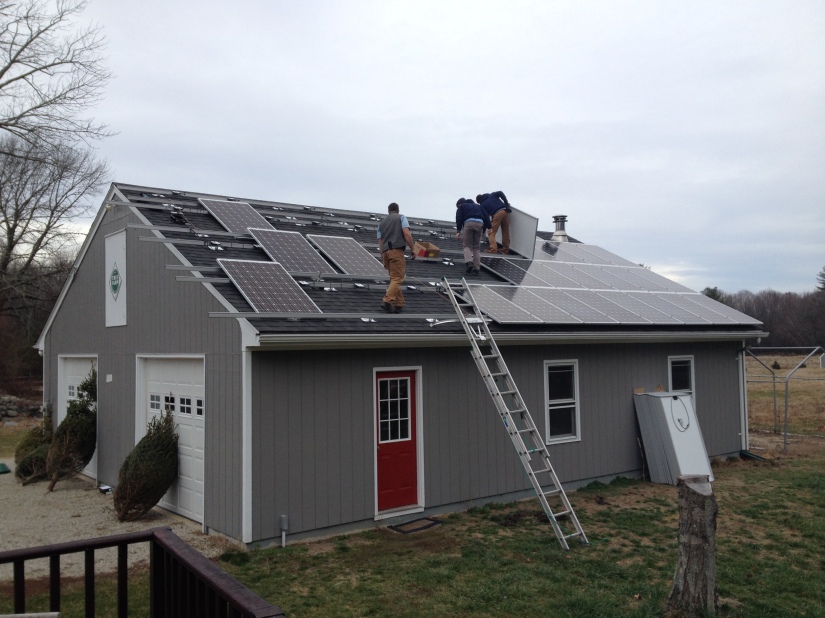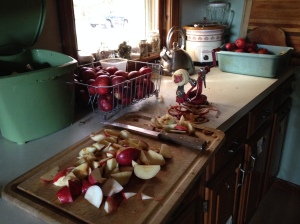—June 18, 2018 update–
Community Vision and Intentions
Inspired in part by a series of open-ended conversations on the subject of ‘community’ hosted by Kerry Bergin, several of us, Karina Lutz, Phil Edmonds, Jim Tull and Kerry decided to take the step to create an intentional community. We started with a vision, roughly captured in this statement, compelled by the ways we see human community, the non-human world, our own psycho-spirituality, the pressures of peak oil and how the ecological, economic, and social crises intersect. We are led by the call to regenerate small-scale communities – to retribalize, in a sense – bringing likeminded people from otherwise different racial, ethnic, religious, economic, sexual, generational and ability profiles and backgrounds to live with and support one another in our material sustenance, personal growth and learning, celebration and grieving. We recognize the challenges of community living under the influence of the dominant culture, with our conditioning to value individualism and privacy, but we also recognize that community living has served our species well for 99% of its years on earth and where it is still in use. To return to community may be difficult for us now, but it is not ‘utopian’, in the sense of being idealistic and impossible. We believe, on the contrary, that commitment to the global, industrial system (dependent on continuous growth, splintering communities, etc.), as a way to meet social and ecological needs, is unrealistic and untenable.
We will participate in community regeneration because:
- We want to consciously choose to create a more sustainable way of life;
- We miss each other and deserve the happiness of being together with our friends and families;
- We need to experiment with self-organizing social systems at this time of energy descent (post-carbon transition), particularly in non-hierarchical ways;
- We want to test alternatives to the root cultural causes of ecocide. For example, we want to dissolve the culturally fabricated walls erected between individuals, couples and families, between generations and classes, between humans and non-human nature;
- Tribal communities work better for humans as a form of social organization than do mass, hierarchical alternatives;
- We can no longer afford to move our bodies and our lives so fast, and desire in any case to slow down. Transition from peak oil to sustainability means both scaling down and slowing down;
- And we can take care of each other more easily and naturally if we live together.
Two of us purchased a farm located at 87 Reservoir Rd, Chepachet (RI) in June 2015. In order to balance the need for and efficiencies of community with the need and desire for solitude and privacy, we envision creating small, cabin-like shelters (including retrofitting existing outbuildings) for sleeping and other alone-time activities. We will share one kitchen, and will prepare and serve dinner, at least, in the shared house to all residents on site each evening. The house will also provide shared office/farm work space, other sleeping rooms and a convertible guest room. At this point, we envision a community of 10-15 residents will live on the farm eventually, but the current septic allowance for this property is 6 individuals. Our plans to convert to composting waste treatment we hope will allow for more residents. Other practical, procedural and logistical features we intend to include:
- Regular community meetings and conflict prevention and resolution/management processes;
- A participatory democratic decision-making process, such as “consensus minus one” whole group decision-making, with ‘sense of the group’ practices leading up to final decisions;
- Simple living, energy conservation and material cycling (e.g., compost toilets, rain capture, passive solar and super-insulated (e.g. Passivhaus) buildings and renewable energy systems);
- Growing food for the community (and others when possible), using sustainable farming, hunting and gathering, such as permaculture and wildcrafting practices; and possibly a market-farm partner on-site.
- New resident screening process and trial period;
- Opportunities for agreed-upon community mind/body/spirit practice and also an acceptance of a variety of individual practices (yoga, meditation, prayer, etc.) or none;
- Sharing responsibilities and work of the homestead, allowing for the particular skills members bring to the community as well as sharing basic chores, etc.
- Sharing many things, such as meals, cars, appliances, kitchen, laundry, bathrooms, etc., to conserve resources and make community living more affordable than single-family housing. However, this is not an income-sharing community, i.e. a “commune.” Private ownership of cars and personal effects will be allowed and rules for borrowing established by the owners.
- The cooperative as a whole will own and share the common house, barn, appliances, solar power equipment, tractor, many tools, etc. Rules about sharing will be developed through the group decision making process (see 2).
- A market farmer or farm family could buy a special share that designates a portion of the arable land for market farming, to be stewarded by the farmer(s) in contract with the housing cooperative. See below for details.
Our community aspires to provide educational service to the state and beyond. We will promote and conduct workshops (Karina and Jim currently facilitate deep ecology – the ‘Work that Reconnects’ – workshops, as an example) and host apprentices who will live with us for a summer or semester to learn community life, food and shelter provision and about local/global transition to sustainable living more generally. We may choose to partner with an existing nonprofit organization to help raise money, recruit apprentices, and provide high school or college credit.
We would like to ensure affordability and equality by setting up ownership as a limited equity co-op. The limited equity co-op is an alternative legal ownership entity which allows people to buy into the property and own shares of the co-op and thereby be given rights to live there and use designated and shared space for living and working. A share grants holders the right to live in and otherwise use the land and structures, but also to transfer this right by selling their share to others at the price of initial purchase (or whatever the market will support if less than the purchase price). Unlike a condo, the co-op community has the right to accept or reject new members when shares are transferred.
Young families could own one share per adult. As children mature, parents could buy them their own shares to have the permanent right to live in the community with their own space. Members could also buy shares for their parents as desired. We would like the community to be intergenerational and balanced.
Non-shareholders might rent from shareholders on a sliding scale determined by the community, and permitted to live with us on a case-by-case basis. Apprentices could be provided free housing and food and be expected to work a specified number of hours each week.
A market farm partner would have a special contract with the community as well as being members of the community through the purchase of their own co-op share(s). The market farm business would be owned independently by the farm family. The contract would provide the security of land tenure to the farmers and would allow the community to choose another farmer if the farm family retires or moves away or otherwise is ready to transfer the farming rights to another farmer. Other land would be designated to be used by community members for the subsistence needs of the resident community.
In further service to our belief that we belong to the land, it does not belong to us, and that houses are primarily for shelter, not investment, the community may also decide to remove its property from the speculative market and conserve it through a land trust and/or selling development rights to the state. Such an arrangement would also serve to preserve the land and the farmer partners’ land tenure. Portions of the property may be designated for farming, open space, or residential uses.
Karina and Jim are purchasing the property and will hold title until the co-op is created, at which point they will begin to sell off shares (raising funds for property improvements, tools, etc. and payback loans). Our intention is to transfer private ownership to the limited equity cooperative once the sale is complete, the co-op structure formed, and members are ready to buy in.
This statement of intent and vision is a start, a stepping off point for further evolution and revision. We look forward to the new ideas and refinements new community members and experience will bring to the process!
 The last of our open-house potlucks for 2019 is Oct. 5, 4-8 pm. Please come if you are interested in living and/or farming here, or just to connect, stay in touch, enjoy the farms and home, and hear more about what we are doing.
The last of our open-house potlucks for 2019 is Oct. 5, 4-8 pm. Please come if you are interested in living and/or farming here, or just to connect, stay in touch, enjoy the farms and home, and hear more about what we are doing.
 One of the most disturbing social trends (and there are so many) unfolding beneath our feet here in the US is farmers being priced out of land ownership. Since former Secretary of Agriculture Earl Butz infamously demanded, “get big or get out!” millions of small farms foreclosed, went bankrupt, or got pushed out of the business. Agribusiness replaced agriculture: Wendell Berry sounded the alarm of the Unsettling of America. And now it’s getting worse.
One of the most disturbing social trends (and there are so many) unfolding beneath our feet here in the US is farmers being priced out of land ownership. Since former Secretary of Agriculture Earl Butz infamously demanded, “get big or get out!” millions of small farms foreclosed, went bankrupt, or got pushed out of the business. Agribusiness replaced agriculture: Wendell Berry sounded the alarm of the Unsettling of America. And now it’s getting worse.






